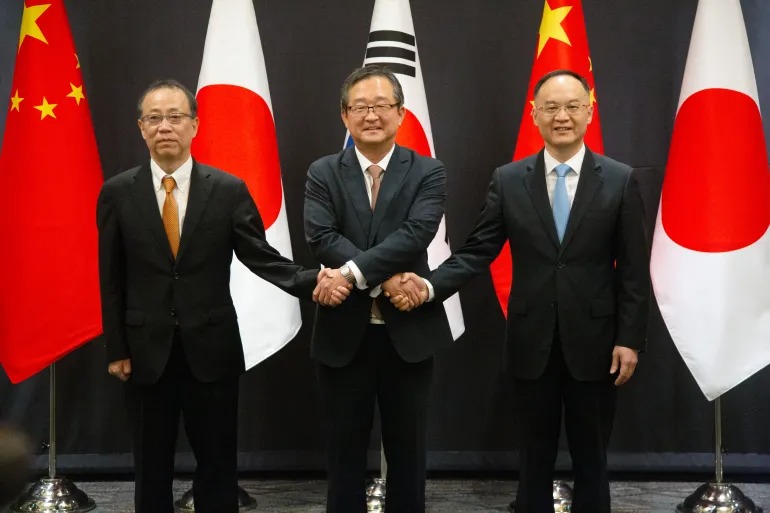South Korea played host to high-ranking officials from Japan and China in a rare trilateral meeting aimed at mitigating rising tensions on the Korean Peninsula. This unprecedented gathering comes at a critical juncture as North Korea intensifies its weapons tests and establishes newfound connections with Russia, while South Korea strengthens its security ties with the United States. The meeting also seeks to revive a long-suspended trilateral leaders’ summit, signifying an effort to bridge divides and bolster regional stability.
A Diplomatic Balancing Act
South Korea has been increasingly forging alliances with the United States and Japan in response to North Korea’s consistent testing of prohibited weapons and its courting of Russia. In a show of unity, South Korea, Japan, and the United States celebrated a “new milestone” in cooperation during an historic summit held in Washington, D.C. this past August. Alongside these diplomatic efforts, the three nations have been conducting regular military drills, affirming their commitment to regional security.
Rekindling Trilateral Relations
Tuesday’s meeting witnessed the participation of South Korean Deputy Foreign Minister Chung Byung-won, Japanese Senior Deputy Foreign Minister Takehiro Funakoshi, and China’s Assistant Foreign Affairs Minister Nong Rong. Prior to this, the trio held discussions with South Korean Foreign Minister Park Jin, who emphasized the importance of close collaboration and the necessity to “produce tangible outcomes that benefit the people of the three countries.”
This gathering marks the revival of trilateral summits, which had their beginnings in 2008 but were suspended in 2019 due to the COVID-19 pandemic and longstanding disputes between Tokyo and Seoul, rooted in historical issues stemming from Japanese colonial rule and World War II.
Beijing’s Watchful Eye
China, North Korea’s principal ally and vital trading partner, has been closely monitoring developments on the Korean Peninsula. Recent actions, including sending senior officials to Pyongyang’s military parades, underscore China’s commitment to preserving its influence in the region. Beijing recognizes the potential implications of deepening security ties between Seoul and Tokyo and the United States, hence its keen interest in this trilateral meeting.
Chinese foreign ministry spokesperson Wang Wenbin emphasized the shared interests of the three neighboring nations and the importance of strengthening trilateral cooperation. This diplomatic engagement signifies a concerted effort to maintain regional stability and address common concerns.
As South Korea takes center stage in orchestrating this critical diplomatic effort, the world watches with bated breath, hoping for productive dialogue that can lead to positive outcomes amidst the complex geopolitical dynamics of Northeast Asia. The diplomatic tightrope walk to reassure Beijing while addressing the North Korean challenge remains a significant foreign policy endeavor in the region.















